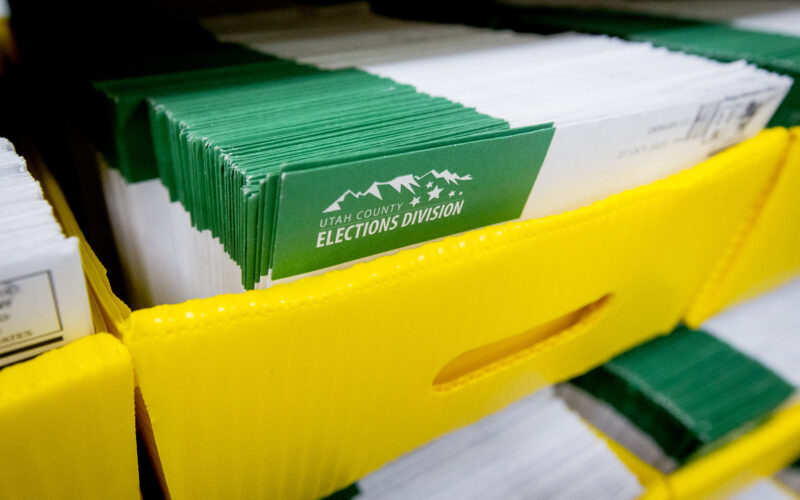Survey shows positive response to ranked choice voting

Isaac Hale, Daily Herald file photo
Completed ballots wait to be processed at the Utah County Administrative Building in Provo on Monday, Nov. 2, 2020.With the general elections in the rearview mirror, and future candidates already throwing their hats into the political ring for next year, Y2 Analytics did a wrap-up survey on ranked choice voting.
In the previous election, only Vineyard and Payson participated in the pilot program for RCV. This time around there were cities in Salt Lake, Utah and Grand counties that participated in the program.
The survey of 1,995 voters appears to give a favorable nod to ranked choice. Of those surveyed, 1,471 were in RCV cities and 524 were in non-RCV communities. The margin of error was +/- 2.6%.
“Overall things went well and we were pleasantly surprised,” said Taylor Williams, deputy clerk/auditor over elections in Utah County.
“There was nothing substantial where we were having to delay things,” Williams said. “Everyone seemed to be happy with the outcome.”
There are always a few candidates that don’t understand the process, but Williams said there were few this election.
According to the survey, 81% of the respondents said it was at least somewhat easy to vote. Of that, 52% said it was very easy.
Other questions including the clarity of instructions on voting were part of the survey. About 90% said the instructions were at least somewhat clear and of that group, 63% felt the instructions were very clear.
Overall, three out of five voters liked the process, according to the survey.
“When asked which election rules and outcomes they prefer, voters are divided,” according to survey analysts. “Even among those who participated in RCV elections, our respondents were split on whether it’s important to have the winning candidate get a majority or just a plurality of votes. Absent any details about how RCV works in practice, non-RCV participants heavily favor the status quo, winner take all election rules.”
Once presented with additional detail about how RCV ensures a candidate wins a majority of the votes in an election, about 85% of all respondents — RCV participants and non-RCV participants alike — say it is important that a candidate wins a majority of votes in an election.
“While this appears to be a disconnect given that non-RCV participants are more resistant to ranked choice voting when explicitly asked what rules they favor, it does highlight a potential opportunity to persuade those who may be on the fence about this process,” Gibb and Monson reported.
Both RCV and non-RCV participants are interested in seeing RCV employed more often in Utah elections, according to the survey.
Half of RCV participants think the process should be used for statewide elections while 19% think it should be used for only local elections, according to the survey.
Among non-RCV participants, a total of 54% say RCV should at least be done in local elections, and 36% believe it should be used for statewide elections.
The survey was commissioned by Stan Lockhart and Utah Ranked Choice Voting and conducted by Kyrene Gibb and Quin Monson, founding partner of Y2 Analytics.



